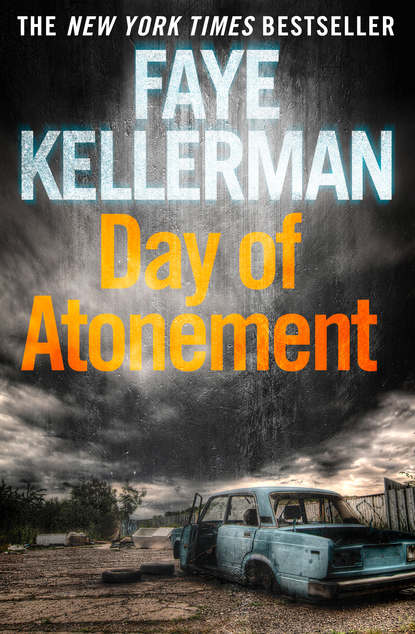По всем вопросам обращайтесь на: info@litportal.ru
(©) 2003-2025.
✖
Day of Atonement
Автор
Год написания книги
2019
Настройки чтения
Размер шрифта
Высота строк
Поля
But the Lazarus family had been grateful, though no one had ever explicitly told him so. It was just implied that they were grateful because everyone was suddenly more respectful to him whenever he called Rina.
Another little piece of dirt neatly swept under the carpet.
Sora Lazarus said, “The men already went to the mikvah. You want me to take you there?”
“Let’s let it go this time, Eema,” Rina said.
It was customary for men to go to the ritual bathhouse before the high holidays. But the idea of bathing in communal water made Decker squeamish. He gave her an appreciative smile.
Sora Lazarus said, “Then maybe you’d like some breakfast? A cup of coffee?”
“A cup of coffee sounds great,” Decker said.
“Then you sit at the table,” the little woman said. “I’ll get you some coffee and a little pastry—”
“Just coffee, please,” Decker said. “Black.”
“Black?” Sora Lazarus said. “No milk? No sugar?”
“Just black,” Decker said. “Please.”
“Rina,” Sora Lazarus said, “sit with your husband. I’ll bring you some coffee, too.”
“I’ll get it,” Rina said.
“Don’t be silly,” chided Sora Lazarus. “Sit.”
A moment later they were alone in the dining room, sipping coffee at a table fit for a mess hall.
“The Lazaruses are having a bit of company?” Decker asked.
“Thirty-six people. Not including the kids’ table.”
“A small intimate meal.”
“It’s tradition,” Rina said. “My mother-in-law always has the Levine family over on the first night of Rosh Hashanah; we go over to the Levine house for lunch the next day.”
“How many Levines are we talking about?”
“Rabbi and Mrs. Levine, their five children and who knows how many grandchildren. And Mrs. Levine’s parents. They must be in their eighties by now.”
“Is everyone going to talk in Yiddish?”
“The grandparents do, but the five kids are our age. The oldest must be a few years younger than you. Shimmy—nice guy, good-looking, too.”
“You notice these things.”
“I’m religious but not blind.”
“Well, you’d have to be nearsighted to marry me.”
“You’re fishing for compliments, I’ll give you one,” Rina said. “I think you’re gorgeous. Or as they say in Brooklyn, gohjus.”
Decker said, “Am I as gohjus as Shimmy?”
“Better,” Rina said. “Shimmy—like you—has a good sense of humor. I think you’ll like him.”
“I can feel a friendship brewing.”
“Oh, cut it out.” She punched him in the shoulder. “Mrs. Levine’s youngest son, Jonathan, is—believe it or not—a Conservative rabbi.”
“A rebel in the midst.”
“You make light, but his father’s heartbroken.”
Decker shook his head. “That kind of reactionary thinking is incredible to me.”
“That’s because you don’t understand what it represents to Jonathan’s father. Conservative Jews don’t believe that oral law is as important as written law. So oral law—which is holy to us—can be changed by man. That’s a major break, Peter. Even though Jonathan is pretty traditional in his own practices, his father feels that Jonathan has rejected him and everything he believes in.”
“Is that what you think?”
“I don’t agree with Jonathan, but I know he’s sincere. And although I understand Rav Levine’s feelings, I feel bad for Jonathan. His father makes this big show of not speaking to him—unless they’re arguing Jewish law. Mrs. Levine ignores his hostility and invites Jonathan to every holiday meal. It’s uncomfortable at first, the father addressing Jonathan in the third person. ‘Can someone ask Mister Levine to pass the flanken?’ Mr. Levine, mind you, never Rabbi Levine. It’s become sort of a joke by now, but I know it makes Jonathan feel lousy.”
“And here I thought this was going to be boring.”
Rina smiled. “Jonathan’s mother is more tolerant. You’ll like her, Peter. She and Mama Lazarus are best friends. She’s as feisty as they come. She was a legal secretary for the criminal court system in Queens for years, always worked, which was very unusual for Orthodox women her age. Being a cop, you two will probably have lots to talk about.”
“Yes, we can talk about assholes”—Decker smiled—“excuse me—miscreants.”
“You’re going to have to watch that.”
“No problem, honey,” Decker said. “I don’t intend to talk much.”
“I know this is very hard for you,” Rina said. “A lot of change in the last couple of years.”
“True ’nough, woman, true ’nough.”
Rina hesitated, then whispered, “Are you happy?”
“Ecstatic.”
Rina looked at his deadpan expression. “I’m serious.”
“So am I.” Decker took her hand. “From the bottom of my heart, I couldn’t be happier. I love being married to you.”
“Good,” Rina answered. But her expression was troubled. “Do you like being an observant Jew?”
Decker said, “I wouldn’t have converted if I didn’t like it.”











